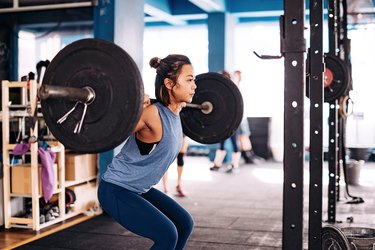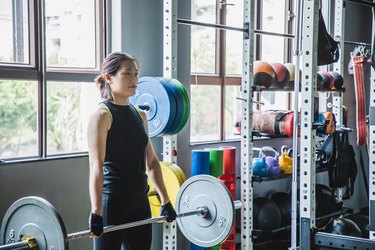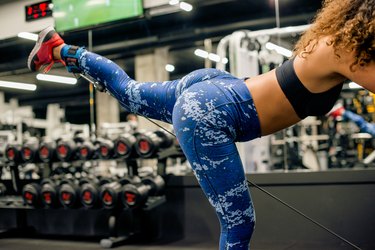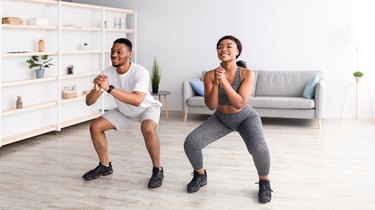
If you have a big butt, raise your hand if one or more of these phrases has ever crossed your lips: My thighs are too thick. My hips are too wide. My booty is too big.
If you were born blessed with a big butt and thighs, you may have lamented your shapely figure at one time or another. After all, unrealistic images of thin bodies abound on social media, and, well, just about everywhere else too. Even if you celebrate your curves, sometimes it's tough not to fall prey to these impractical — and often unhealthy — expectations.
Video of the Day
Video of the Day
But science suggests that a little junk in the trunk touts a bunch of benefits — and we're not just talking about filling in your fave pair of jeans. Here are seven fantastic reasons to take pride in your pronounced posterior, thick thighs and curvaceous hips.
1. You’re Less Likely to Develop Certain Chronic Illnesses
Thick thighs save lives. Indeed, people with larger hip and thigh circumferences appear to have a lower risk of early death from any cause compared to those who carry their fat around their abdomen, regardless of overall body fat, according to a September 2020 meta-analysis in The BMJ.
This might be because "higher subcutaneous thigh fat in women is related to lower glucose and triglyceride levels, while belly fat is associated with higher glucose and triglyceride levels," Pauline Jose, MD, a clinical instructor at UCLA and family medicine specialist at pH Labs, tells LIVESTRONG.com.
What's more, "abdominal fat tends to be more metabolically active than thigh fat, as it sends signals throughout the body and produces more cytokines, which may lead to insulin resistance [possibly] causing type 2 diabetes mellitus," Dr. Jose says.
Conversely, "people with bigger behinds produce more hormones that metabolize glucose, helping to prevent diabetes," she adds.
And there's more good news: Having a big butt may boast benefits for your heart health too. Pear-shaped people tend to have lower cholesterol levels and their bodies release more adiponectin, an anti-inflammatory hormone that protects blood vessels, Dr. Jose says. All this is to say, a little wiggle below the waist is linked to a reduced risk of heart disease.
2. You Have a Leg Up Above the Neck
People with bigger booties seem to stockpile more healthy fats in their bottoms, per a January 2010 study in the International Journal of Obesity. As such, a plump posterior may be indicative of higher omega-3 levels. So, how does this bolster your brainpower?
Well, omega-3 fatty acids are the polyunsaturated fats responsible for building cell membranes in your brain, per Harvard Health Publishing. And they possess anti-inflammatory and antioxidant properties, which may help support healthy brain cells and prevent cognitive decline.
Consequently, a voluptuous bum can act as "storage for good fats in the form of omega-3 fatty acids, which catalyze brain development" and give people with bigger butts those mental benefits, Dr. Jose says.
Good Sources of Omega-3s
Fuel that healthy fat reserve in your butt by munching on omega-3-rich foods such as:
- Fish like salmon, herring and sardines
- Oysters
- Nuts and seeds like flax, chia and walnuts
- Tofu
- Beans like edamame, navy and kidney beans
- Avocados
3. You Can Push Harder in Workouts
A bodacious booty can even help improve your workouts. That's because the gluteus maximus is the largest muscle in the human body. This powerhouse in your posterior chain (which is the network of muscles along your back side) helps you hold an upright posture and execute vital lower-body movements like climbing stairs, according to the Library of Congress.
And because your glutes are so sizable, you draw a lot of force from them. So, whether you want to lift heavier or run faster, if you have a big butt, it can help you increase your strength and speed gains. Plus, you'll torch a ton of calories in the process (think: bigger muscles use more energy).
4. You May Have Less Back Pain
Having a brawny backside may buffer you from backaches.
Indeed, building strong glutes may reduce lower back pain and enhance lumbar muscle strength and balance, per a December 2015 study in the Journal of Physical Therapy Science.
5. You Might Have Better Posture
Your glutes are a key part of your posterior chain. Poor posture, like slouching forward at your desk, typically indicates weak muscles through the back of your body, according to Cornell University.
But having a strong posterior chain allows you to better stack your spine, hold yourself upright and stave off those achey side effects of slumping.
Tip
Strengthening your posterior chain with regular back exercises and butt workouts isn't just good for posture: It can also increase your stability and mobility, per Cornell University.
6. You're Better Protected Against Leg Injuries
Your hamstrings have to work overtime to compensate for weak glutes, which can up your risk for overuse injuries like a muscle strain or tear, according to Harvard Health Publishing.
A big, strong butt, on the other hand, can help keep your leg muscles balanced and healthy to prevent potential injury.
7. When You Love Your Body, You Reap the Healthy Benefits
Whether you've always embraced your big booty and thighs or you're learning to love your curves after hearing about all their benefits, taking pride in your shape is paramount to promoting healthy self-esteem.
"When you have high self-esteem, you are more likely to be your best in every sphere of your life," Juhee Jhalani, PhD, a NYC-based clinical psychologist, tells LIVESTRONG.com.
For one, people who feel good about themselves — and their bodies — tend to actively engage in social situations and enjoy deeper, more fulfilling relationships with others, Jhalani says.
And when a person is happy with their body, they are more likely to participate in healthy physical activities, especially with peers, such as team sports and group workouts, she explains.
Conversely, a person struggling with a negative body image may shy away from group settings, which can offer much-needed support, positive reinforcement and motivation, Jhalani says. This may result in unhealthy behavior patterns like not exercising regularly, which can lead to even more negative feelings about one's body.
What's more, when we embrace our bodies, exercise frequently and bond with others, we release happy hormones including dopamine, oxytocin and serotonin, Jhalani says. These neurotransmitters make us feel great and encourage us to continue these positive behaviors.
On the other hand, when we don't release enough of these feel-good chemicals, "we feel sad, anxious and depressed, making it harder to exercise, socialize, eat healthy and live a more meaningful life," Jhalani says.
How to Embrace Your Shape
Having a hard time seeing your big booty and thighs in a favorable light? Below, Jhalani offers some strategies to help you start fostering a positive body image:
1. Try Compassionate Self-Talk
Identify one specific negative thought that bothers you about your body. For example, 'I have huge thighs.' Write the statement on a piece of paper, then hold it in front of you and envision yourself as a young child having these thoughts. Now answer the following question: 'What would you say to the inner child if she had these thoughts?'
You'll be surprised that the dialogue you engage in with yourself as an 'inner child' is more compassionate and accepting, and it may help soothe the body-shaming messages you received during your early life experiences.
2. Focus on the Positive
Do a full-body visual scan in front of a mirror and acknowledge all the features of your body that you value and admire. Keep the list of these qualities handy, and whenever you feel down, read it aloud to yourself.
3. Choose Your Company Wisely
Surround yourself with positive people who celebrate diversity.
Do not engage in conversations that involve overt or covert body-shaming of yourself or somebody else. Compliment people generously and accept compliments that you receive gracefully.
Remind yourself that many images, which are often photoshopped, do not reflect reality. Unfollow accounts and people that trigger anxiety and discomfort.
5. Wear Clothes That Enhance and Celebrate Your Body
When shopping in stores, be bold and reach out to the store associates for style/fitting advice. They are more than willing to offer tips on how to dress in a flattering way based on your body type.
Tip
Sometimes body image issues can be tied to past trauma, problems with family of origin, negative experiences in intimate relationships, bullying, poor parenting or abuse. If that's the case for you, consider seeking professional mental health help to work through these issues and achieve a healthier body image.
- Library of Congress: “What is the strongest muscle in the human body?”
- Journal of Physical Therapy Science: “The effects of gluteus muscle strengthening exercise and lumbar stabilization exercise on lumbar muscle strength and balance in chronic low back pain patients.”
- The BMJ: “Central fatness and risk of all cause mortality: systematic review and dose-response meta-analysis of 72 prospective cohort studies.”
- Harvard Health Publishing: “Do omega-3s protect your thinking skills?”
- International Journal of Obesity: “Gluteofemoral body fat as a determinant of metabolic health.”
- Cornell University: "CFC Blog - Strengthening the Posterior Chain"
- Harvard Health Publishing: "Are your hamstrings working double duty?"



